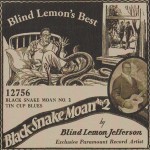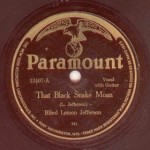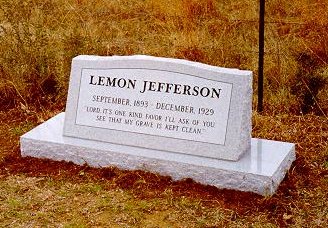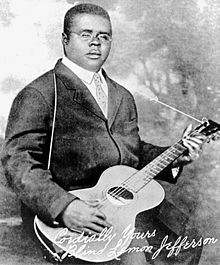Best of Blind Lemon Jefferson 23 Tunes
“Classic Sides” Box – 92 Songs
“King of the Country Blues” 23 songs
Anyone who has seen the film Black Snake Moan is rightly familiar with the immortal sound of Blind Lemon Jefferson. In the film, actor Samuel L. Jackson plays a rendition of Jefferson’s famous song of the same name for co-star Christina Ricci. He sets the stage as he mutters, “I haven’t played for nobody in years,” as a storm outside threatens to cut the electricity to the house and Jackson strums the first bluesy chords. Magically, viewers are transported to a painful realm as Blind Lemon Jefferson’s lyrics and Sam Jackson’s gravelly voice intertwine and mingle to tell a story of shame and regret. That’s the story of the blues, though, and Blind Lemon Jefferson played a pivotal role in his life as a musician in writing and shaping that story, the anguished tone of the Texas blues. Jefferson was born in Texas on September 24, 1893 and grew up poor amidst the dusty Texan landscape. He was born blind to sharecropper parents near Wortham, Texas and had 8 brothers and sisters. He started playing the guitar in his early teen years, first at family gatherings and later as a street musician often entertaining at brothels in East Texas. The music of the brothels helped inform his music with an ironic, distinctly mournful feeling.
 Jefferson also received influence and instruction from two of the most legendary blues players in history, Aaron Thibeaux Walker, better known as T-Bone Walker, and the accomplished bluesman Leadbelly. Both musicians were living in or nearby Dallas, Texas at the time and Jefferson soon relocated to that city. It is not known as to whether Blind Lemon ever married or had children but by the 1920s he was earning enough money from his performances to support a family. His first recording took place in 1925 in Chicago, Illinois and was comprised of two gospel songs, “I Want to be Like Jesus in My Heart” and “All I Want is That Pure Religion.” It was not until his second official recording that Jefferson unveiled his fabled sound, noted for its inventive guitar, not mention his unique, high pitched voice. He was self-taught and so developed a sound uniquely tailored to the trials of growing black and blind in the Texas oil fields. It was a sound that resonated across the nation with listeners.
Jefferson also received influence and instruction from two of the most legendary blues players in history, Aaron Thibeaux Walker, better known as T-Bone Walker, and the accomplished bluesman Leadbelly. Both musicians were living in or nearby Dallas, Texas at the time and Jefferson soon relocated to that city. It is not known as to whether Blind Lemon ever married or had children but by the 1920s he was earning enough money from his performances to support a family. His first recording took place in 1925 in Chicago, Illinois and was comprised of two gospel songs, “I Want to be Like Jesus in My Heart” and “All I Want is That Pure Religion.” It was not until his second official recording that Jefferson unveiled his fabled sound, noted for its inventive guitar, not mention his unique, high pitched voice. He was self-taught and so developed a sound uniquely tailored to the trials of growing black and blind in the Texas oil fields. It was a sound that resonated across the nation with listeners.
 After signing Jefferson, Paramount Records quickly became the foremost supplier of American blues recordings through the 1920s, selling more records than any other company. In his second recording, Jefferson released the hit blues songs, “Booster Blues” and “Dry Southern Blues” and took the country by storm. He released a river of songs through 1929, over 100 songs in all, for Paramount in the 1920s. By the late twenties, however, Jefferson decided to leave Paramount on account of a royalties dispute with the recording company and joined up with OKeh Records in 1927. It was with OKeh Records that Jefferson recorded the immortally mournful “Black Snake Moan”.
After signing Jefferson, Paramount Records quickly became the foremost supplier of American blues recordings through the 1920s, selling more records than any other company. In his second recording, Jefferson released the hit blues songs, “Booster Blues” and “Dry Southern Blues” and took the country by storm. He released a river of songs through 1929, over 100 songs in all, for Paramount in the 1920s. By the late twenties, however, Jefferson decided to leave Paramount on account of a royalties dispute with the recording company and joined up with OKeh Records in 1927. It was with OKeh Records that Jefferson recorded the immortally mournful “Black Snake Moan”.
The exact details of his death are, to date, questionable. Some say he died of a heart attack. Others claim he froze to death in a Chicago blizzard. Still, others insist that his morning coffee was poisoned by some slighted lover. Ironically, Jefferson’s famous song, “See That My Grave is Kept Clean,” which has been covered by the likes of Bob Dylan, the Grateful Dead and B.B. King, must not have been a favorite for the caretakers of the cemetery in Wortham, Texas. His grave, unmarked until 1967, was not much more than a tangle of scrubby weeds for many years after his death on December 19, 1929. In 2007, however, the cemetery was renamed Blind Lemon Jefferson Memorial Cemetery and a large granite headstone now marks the final resting place of a man whom some call “The Father of the Texas Blues”.


 US Dollar
US Dollar UK Pound
UK Pound Euro
Euro English
English French
French German
German Spanish
Spanish Russian
Russian
